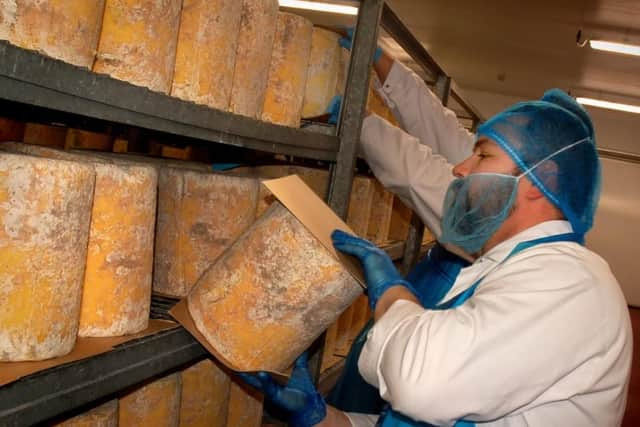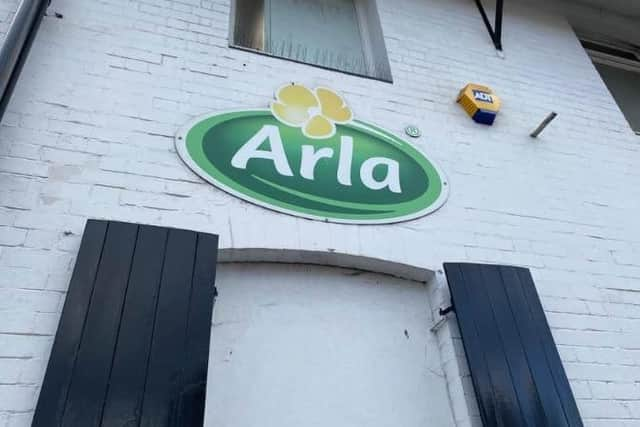
The industry suffered a major blow last month when Arla Melton Mowbray Creamery – known locally as Tuxford and Tebbutt – confirmed it would be closing.
That leaves just four Stilton producers left, with Long Clawson Dairy the only one remaining in Leicestershire.
The Arla closure, which will see 60 employees lose their jobs, was blamed by the company on a decline in the speciality cheese market in the UK.

The Melton Times spoke to Clawson managing director Bill Mathieson to find out how it is coping with the challenging market conditions.
Mr Mathieson told us: “It is tough news for the guys down at Tuxford and Tebbutt, which is a fellow farming co-operative with a similar business to ours.
“But we have exciting plans ahead for Stilton and the other cheese-making we are doing.
“If there are people being made redundant we would love to retain that cheese-making capability and that skill set within the area.

“There are some brilliant people who work there and we are always needing people.
“We want to send an open invitation to contact our HR team and we will make sure we give them an opportunity to come and see us.”
Long Clawson Dairy is a co-operative with 30 farming members across Leicestershire and Nottinghamshire.
The company meets with its dairy farmers every month and holds surgeries for them regularly, as well as formal meetings where they are updated on the business.

“We have a good growth plan over the next 10 years and we can be a haven for dairy farmers in the area who want to come and join a co-operative,” said Mr Mathieson.
“We are going to need more milk and we would love to talk to dairy farmers about our plans and how they can have a direct input in the business.”
So what is the state of play in the Stilton industry?
Mr Mathieson explained: “The sad thing is we’ve gone from eight producers 10 years ago to being in a position where we have four – ourselves, Hartingon, Cropwell Bishop Creamery and Colston Bassett Dairy.
“The reality is the Stilton market has been in decline.
“Since 2016, about 1,400 tonnes have dropped out of the market – that’s about 15 per cent. A mixture of UK retail, other UK channels and exports.
“But, whilst others have been in decline, we’ve actually been doing okay – because of the improvements we’ve made to the site we’ve been gaining share from the other players in the market.”
Clawson managers know they need to do more to attract buyers for Stilton in a competitive market for speciality cheese, which also includes the likes of Brie, Dolcelatte, Camembert, Edam, Gorgonzola, Gouda and Gruyere.
“It is important for us to recognise we are not competing with just Stilton makers,” Mr Mathieson pointed out.
“We are competing in the speciality cheese market and 70 per cent of people who buy Stilton buy other speciality cheeses as well.
“We are trying to make sure the message coming out from Stilton makers is that we have to drive consumption in different ways.”
So what is Clawson planning to do get a bigger share of the speciality cheese market?
“Only 20 per cent of households have a cheeseboard so that is a challenge for us,” he explained.
“We’ve got to inspire people to use Stilton in a different way, as an ingredient, and target different eating occasions, such as eating it as a snack, and we have done some work with retailers on this.
“We’ve done some work with Stilton slices and the demographic of people who buy Stilton slices is much younger.”
Clawson makes 40 per cent of its annual Stilton sales in the last six weeks of the year, as Christmas and New Year staple foods.
Mr Mathieson said: “Christmas is when people have a traditional cheeseboard with speciality cheeses.
“We know that 50 per cent of people who buy Stilton only buy it once a year.
“Just imagine if we could get those people buying it just one more time in the year – that would significantly change the dynamic in terms of what is happening with Stilton.”
He added: “There are lots of ways Stilton can be used.
“It’s fantastic on pizzas, on jacket potatoes and with pasta.
“We are optimistic we can build this market and this is a big part of our plan over the next 10 years.
“We have to make Stilton relevant and make sure it is on the menu in restaurants, as an ingredient.
“We are also targeting using it in ready meals – younger people enjoy these and it might encourage them to go and buy Stilton.”
With the recent change in government, Clawson hope new Prime Minister Sir Keir Starmer can help reduce some of the negative aspects of Brexit which has impacted exports for cheese producers.
Mr Mathieson said: “I would like a level playing field on exports, which is about 20 per cent of our business.
“If we are going to get administration costs and checks at the border it has to be quid pro quo. I think that’s fair.”
Brexit did initially massively reduce Clawson’s access to seasonal skilled cheese-making employees from Europe but the company has changed to mitigate this.
“We changed staffing patterns and moved to a more flexible working schedule around school hours and at Christmas time,” he added.
“We’ve also taken on more permanent staff, about 50 more, to help the situation now.”
The company also has a site at Bottesford, where they make additive cheeses like Wensleydale & Cranberry and Huntsman.
You can now read the most important #news on #eDairyNews #Whatsapp channels!!!
🇺🇸 eDairy News INGLÊS: https://whatsapp.com/channel/0029VaKsjzGDTkJyIN6hcP1K




















